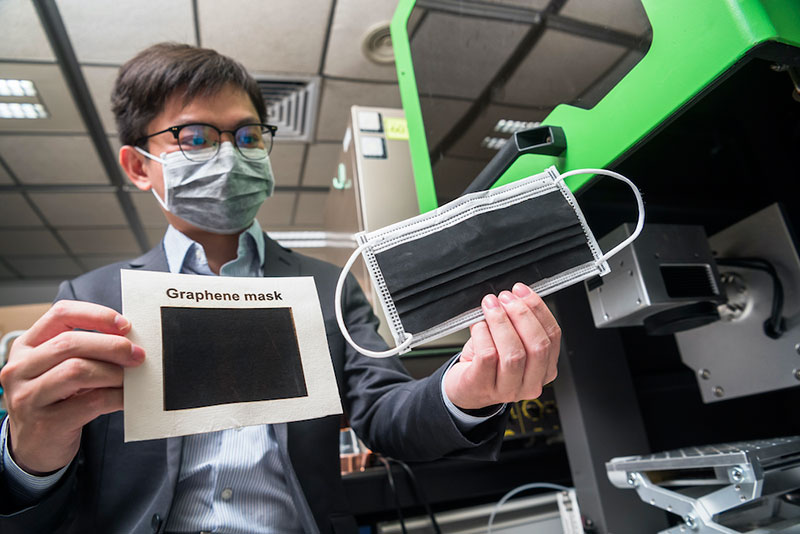
Face masks have become a vital part of our armament in the battle against coronavirus. However, these masks need to be used properly; incorrect use can pose an infection risk. If viral particles settle on the mask, touching or disposing of the mask improperly could result in infection. Now, a team of researchers at the City University of Hong Kong have developed a face mask that can deactivate viral particles or other pathogens on its surface. Laser-induced graphene contained in the mask can kill bacteria and has demonstrated potential in deactivating coronaviruses. The findings were published in the scientific journal ACS Nano.
Read more Face Masks Made Of Electroceutical Fabric Kills Coronavirus On Contact
Dr Ye Ruquan, Assistant Professor from CityU’s Department of Chemistry, and the lead researcher of the study has been studying the use of laser-induced graphene in developing sustainable energy. Graphene is known for its anti-bacterial properties, so as early as last September, before the outbreak of COVID-19, producing outperforming masks with laser-induced graphene already came across Dr. Ye’s mind. He then kick-started the study in collaboration with researchers from the Hong Kong University of Science and Technology (HKUST), Nankai University, and other organizations, reports City University of Hong Kong.
The researchers tested their laser-induced graphene with E. coli, and it achieved high anti-bacterial efficiency of about 82%. In comparison, the anti-bacterial efficiency of activated carbon fiber and melt-blown fabrics, both commonly-used materials in masks, were only 2% and 9% respectively. Experiment results also showed that over 90% of the E. coli deposited on them remained alive even after 8 hours, while most of the E. coli deposited on the graphene surface were dead after 8 hours. Moreover, the laser-induced graphene showed a superior anti-bacterial capacity for aerosolized bacteria.
Dr. Ye said that more research on the exact mechanism of graphene’s bacteria-killing property is needed.

Previous studies suggested that COVID-19 would lose its infectivity at high temperatures. So, the team carried out experiments to test if the graphene’s photothermal effect (producing heat after absorbing light) can enhance the anti-bacterial effect. The results showed that the anti-bacterial efficiency of the graphene material could be improved to 99.998% within 10 minutes under sunlight, while activated carbon fiber and melt-blown fabrics only showed an efficiency of 67% and 85% respectively.
The team is currently working with laboratories in mainland China to test the graphene material with two species of human coronaviruses. Initial tests showed that it inactivated over 90% of the virus in five minutes and almost 100% in 10 minutes under sunlight. The team plans to conduct testing with the COVID-19 virus later.
Their next step is to further enhance the anti-virus efficiency and develop a reusable strategy for the mask. They hope to release it to the market shortly after designing an optimal structure for the mask and obtaining the certifications.
Read more Huami’s Amazfit Aeri Mask Self-Disinfects and Unlocks Your Phone With Face ID
“Laser-induced graphene masks are reusable. If biomaterials are used for producing graphene, it can help to resolve the problem of sourcing raw material for masks. And it can lessen the environmental impact caused by the non-biodegradable disposable masks,” Dr. Ye said.








